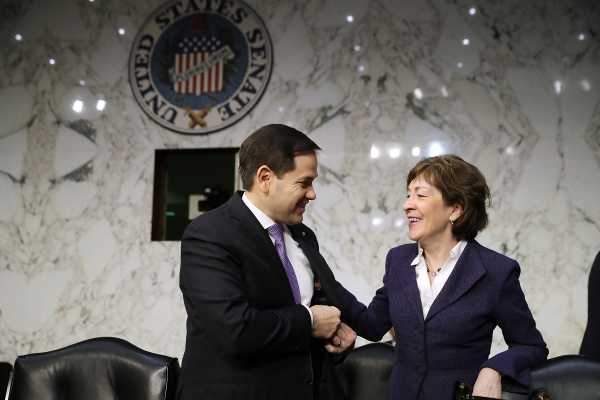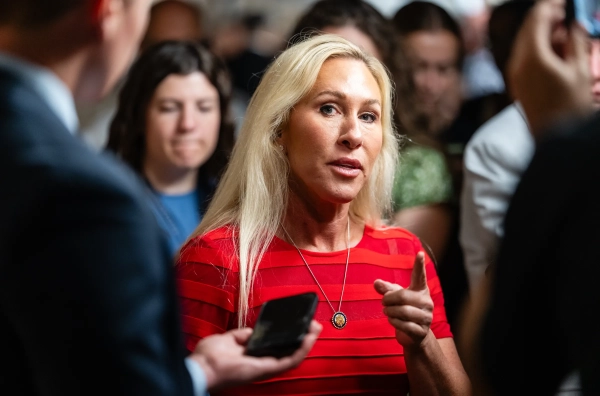
The Republican tax cut bill has found an unlikely critic in its giveaways to big corporations: Sen. Marco Rubio (R-FL). The 2016 Republican presidential candidate — who voted for the legislation in December — is openly doubting it’s actually benefiting American workers and says it is instead resulting in a boost in stock buybacks that benefit shareholders. In fact, he says, there’s “no evidence whatsoever” that American workers are seeing a big tax cut boost.
“There is still a lot of thinking on the right that if big corporations are happy, they’re going to take the money they’re saving and reinvest it in American workers,” Rubio said in a recent interview with the Economist. “In fact they bought back shares, a few gave out bonuses; there’s no evidence whatsoever that money’s been massively poured back into the American worker.”
Rubio — once a rising star in the GOP who is now struggling to figure out where he fits in — spoke with the Economist about his plan for a “reform conservative movement,” the details of which are unclear. The publication says his program is devoted to addressing “economic disruption and social disaffection.”
Rubio pushed to double the child tax credit to $2,000 during the tax debate and to restructure it to allow more poor Americans to access it. He wound up with a sort of half-version of what he asked for — the bill increased the cap on the child tax credit refund from $1,100 to $1,400 but didn’t make it refundable at the first dollar earned, instead starting at household income above $2,500, leaving out the poorest Americans. He voted for the bill anyway, in a statement upon the bill’s passage saying a tax code that is “more pro-growth and pro-family is long overdue” and that he was “proud” to support the bill.
Rubio’s office isn’t denying the senator’s comments to the Economist but is trying to hedge them. They run quite contrary to the Republican line that a big corporate tax cut is good for everyone. “Senator Rubio pushed for a better balance in the tax law between tax cuts for big businesses and families, as he’s done for years,” Rubio spokesperson Olivia Perez-Cubas said in an email to CNBC. “As he said when the tax law passed, cutting the corporate tax rate will make America a more competitive place to do business, but he tried to balance that with an even larger child tax credit for working Americans.”
Rubio’s right: corporations are using a lot more of the tax cut to benefit shareholders than they are to benefit workers
The $1.5 trillion GOP tax cut is a major boon to corporations. It slashed the corporate tax rate to 21 percent from 35 percent, reduced the rate on corporate income brought back to the United States from abroad to between 8 and 15.5 percent instead of 35 percent, and exempted American companies’ foreign income from US tax.
The Republican argument behind the bill is that putting billions of dollars back into the hands of big business will boost the economy, boost wages, and create jobs. But thus far, companies seem to be much more eager to put their tax savings into their shareholders’ pockets by the way of stock buybacks — as Rubio pointed out. Buybacks occur when companies repurchase shares of their own stock. That leaves remaining shareholders with a bigger chunk of the company and increases the earnings they reap per share.
A Bloomberg analysis found that about 60 percent of tax cut gains will go to shareholders, compared to 15 percent for employees. A Morgan Stanley survey found that analysts estimate 43 percent of tax cut savings will go to stock buybacks and dividends, while 13 percent will go to pay raises, bonuses, and employee benefits. Just Capital’s analysis of 121 Russell 1000 companies found that 57 percent of tax savings will go to shareholders, compared to 20 percent directed to job creation and capital investment and 6 percent to workers.
Americans are much likelier to see a notable difference in their stock portfolios than in their paychecks — that is, if they have them. According to Gallup, just over half of Americans own stocks at all. What’s more, the richest 10 percent of Americans own 80 percent of all stock shares. The bottom 80 percent of earners own just 8 percent.
“The tax plan is just the latest in a long line of really bad economic policies that are based on an idea of how corporations work that has nothing to do with how corporations actually work today,” Nell Abernathy, vice president of research and policy at the liberal-leaning think tank the Roosevelt Institute, recently told me. “The idea that we can just return capital to companies and that will trickle down and grow the economy, that may have been true at some point — I’m skeptical — but so much has changed in the way that companies allocate capital.”
There were ways for policymakers to make sure companies shared the wealth they would reap from the tax cuts with more stakeholders than their shareholders. Sen. Cory Booker (D-NJ), for example, recently unveiled legislation that would curb how companies do buybacks and force them to share some with workers.
But when passing the tax bill last year, Republicans didn’t put in guardrails to ensure the tax bill would have broad benefits. Now even Rubio is pointing out those big-ticket bonus announcements don’t really account for much in the grand scheme of tax cut beneficiaries. The tax break aimed at small businesses is mostly benefiting millionaires.
“I personally wish they had done more to directly link corporate rate reductions and pass-throughs, for that matter, to real and tangible benefits for employees, things like IRA matching or employee profit sharing or employee ownership,” Dean Zerbe, managing director at the tax consultancy Alliantgroup and former tax counsel to the Senate Finance Committee, told me last year. “They would have had a better and easier time of selling it and convincing folks that this was real. Now, they’re just going to have to hope that all their words come to fruition.”
Thus far, they’re not.
Sourse: vox.com






